Haider al-Abadi facts for kids
Quick facts for kids
Haider al-Abadi
|
|
|---|---|
|
حيدر العبادي
|
|
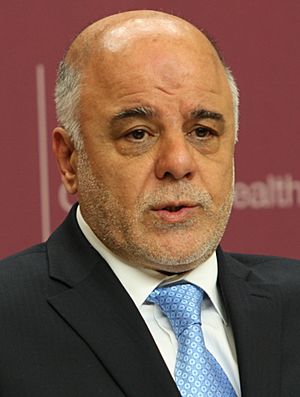
Al-Abadi in 2015
|
|
| Prime Minister of Iraq | |
| In office 8 September 2014 – 25 October 2018 |
|
| President | Fuad Masum Barham Salih |
| Deputy | Saleh al-Mutlaq Baha Araji Hoshyar Zebari Rowsch Shaways |
| Preceded by | Nouri al-Maliki |
| Succeeded by | Adil Abdul-Mahdi |
| Leader of the Victory Alliance | |
| Assumed office 14 December 2017 |
|
| Preceded by | Position established |
| Deputy Leader of the Islamic Dawa Party | |
| In office 15 January 2007 – 8 September 2014 |
|
| Preceded by | Nouri al-Maliki |
| Succeeded by | Baha Araji |
| Minister of Communications | |
| In office 1 September 2003 – 1 June 2004 |
|
| Prime Minister | Iraqi Governing Council |
| Preceded by | Muhammad Saeed al-Sahhaf |
| Succeeded by | Muhammad Ali Hakim |
| Personal details | |
| Born |
Haider Jawad Kadhim al-Abadi
25 April 1952 Baghdad, Kingdom of Iraq |
| Citizenship | Iraq, United Kingdom |
| Political party | Victory Alliance |
| Other political affiliations |
Islamic Dawa |
| Children | 3 |
| Alma mater | University of Technology University of Manchester |
| Profession | Politician |
| Signature | |
Haider al-Abadi (born 25 April 1952) is an Iraqi politician. He served as the Prime Minister of Iraq from September 2014 to October 2018. Before that, he was the Minister of Communication from 2003 to 2004. This was in the first government after Saddam Hussein was removed from power.
President Fuad Masum chose al-Abadi to be prime minister on 11 August 2014. The Iraqi parliament approved him on 8 September 2014. Time magazine named al-Abadi one of the 100 Most Influential People of 2018.
During his time as prime minister, Iraq fought a major war against ISIL. He announced victory against ISIL in 2017. He left office in 2018 due to public concerns and protests in Iraq.
Contents
Early Life and School
Haider al-Abadi was born in Baghdad, Iraq. His family was Shia Arab. His father worked at a hospital and for the Iraqi Ministry of Health. He had to retire in 1979 because of disagreements with the government at the time.
Al-Abadi speaks English. He finished high school in Baghdad in 1970. In 1975, he earned a degree in electrical engineering from the University of Technology in Baghdad. He later earned a PhD in electrical engineering from the University of Manchester in 1980.
Political Journey
Al-Abadi joined the Dawa Party in 1967. Some of his brothers were harmed or imprisoned because they belonged to this party. In 1977, he became a leader for the party in Britain. In 1979, he joined the party's main leadership group. In 1983, the government took away his passport.
Living Abroad
Al-Abadi lived in the UK until 2003. This was a choice he made to stay safe. While there, he worked in different roles:
- He was a director for a company in London that designed high-tech transport systems (1993–2003).
- He worked as a consultant on transportation matters in London (1987–2003).
- He led research for a big project in London (1981–1986).
In 1998, he received a grant from the UK government. In 2001, he registered a patent for a new rapid transit system.
Coming Back to Iraq
In 2003, al-Abadi returned to Iraq. He was concerned about plans to sell off state-owned companies. He believed a proper government should be in place first. He and other ministers protested these plans to the Coalition Provisional Authority (CPA).
As Minister of Communications, al-Abadi helped give licenses to mobile phone companies in Iraq. He made sure that a future Iraqi government could change or end these licenses. This caused some disagreements with the CPA. There were some early reports of issues with contracts, but later investigations showed these were not true.
From 2005, he worked as an adviser to the Prime Minister of Iraq.
He was elected to the Iraqi Parliament in 2005 and 2010. He led the committee for Economy, Investment, and Reconstruction. In 2013, he led the Finance Committee.
Al-Abadi was considered for prime minister several times. In 2008, he strongly supported Iraq's independence. He wanted clear rules for the presence of US forces in Iraq.
He was also involved in a legal case against a security company called Blackwater. This was after an incident in 2007 where civilians were harmed.
Prime Minister (2014–2018)
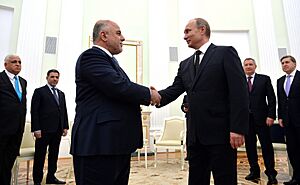
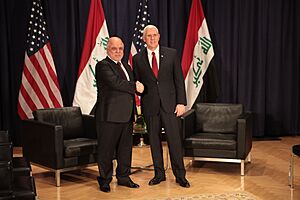
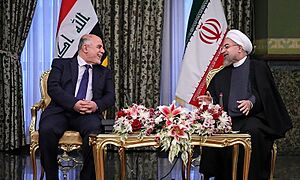
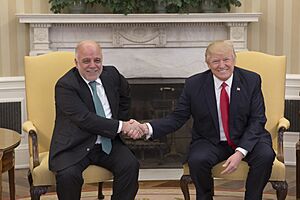
On 11 August 2014, President Fuad Masum chose al-Abadi to be the new prime minister. The previous prime minister, Nouri al-Maliki, did not want to step down at first. However, he later agreed to let al-Abadi take over. Many people in Iraq hoped the new government would help solve problems.
The Iraqi Parliament approved al-Abadi's new government on 8 September 2014. He worked to include more Sunni politicians in the government. He appointed Khaled al-Obaidi, a Sunni politician, as his Defense Minister.
In December 2014, al-Abadi made an agreement with the Kurds about sharing oil money. He also worked to stop corruption in the army. He found that many "ghost soldiers" were on the payroll. These were people who were paid but did not actually serve. He removed 50,000 of them.
Al-Abadi also worked to improve Iraq's relationships with other countries. He visited Saudi Arabia, Egypt, Jordan, and Turkey. These visits helped discuss ways to fight militant groups. His efforts to bring different groups together were seen as a positive change. The United States also promised to help train Iraqi forces and sell fighter jets to Iraq.
Fighting political corruption was important to al-Abadi. In August 2015, he announced a plan to make the government stronger. This included cutting special benefits for high-level officials.
As prime minister, al-Abadi had to deal with the Islamic State. He sometimes disagreed with the United States' approach to this threat. He also worked more closely with Russia and Iran to fight IS.
In April 2016, there were protests in Iraq. Supporters of a religious leader entered the parliament building. This showed some of the challenges al-Abadi faced in making political changes and controlling corruption.
On 9 December 2017, Prime Minister Al-Abadi announced that Iraq had won the war against IS. This marked the end of the Iraqi Civil War (2014-2017).
Adil Abdul-Mahdi became the new prime minister on 25 October 2018.
See also
 In Spanish: Haider al-Abadi para niños
In Spanish: Haider al-Abadi para niños
 | Kyle Baker |
 | Joseph Yoakum |
 | Laura Wheeler Waring |
 | Henry Ossawa Tanner |

